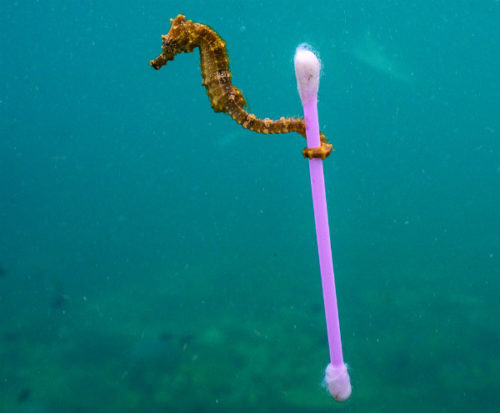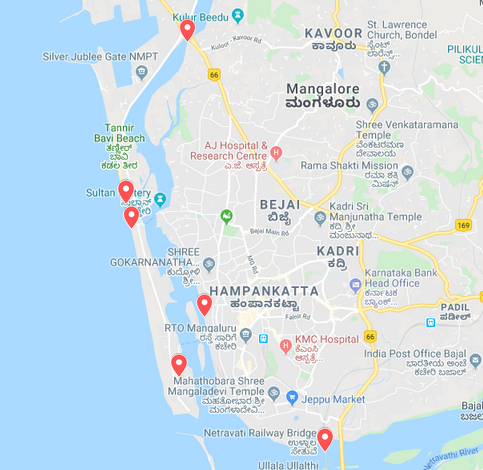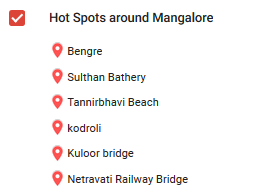Posted by Alliance of Indian Wastepickers
Written by Rohini Malur
Region Asia-Pacific
Country India
November 26, 2019
Written by Rohini Malur. Waste Narratives. 11/26/2019
When we think of marine/ocean plastic pollution, we think of now-famous images by western photographers – the seahorse coiled around a cotton bud, the turtle with a straw stuck in its nose, causing so much pain and fear. Whales with their bellies full of plastic, and seagulls with their beaks stuck in can rings.

Justin Hofman’s picture of a seahorse wrapped around a cotton bud, off the coast of Sumbawa, Indonesia.
Our own beaches are not much better. Plastic bottles, plastic bags, food containers – this debris is found in every urban city, and it is worse in beachy areas where tourism creates an influx of people, seasonally throughout the year. This is on top of the regular solid waste produced by locals and residents. This deluge of plastic is not localised to the beach. Take Mangalore, for example. The rivers Gurpura and Nethravathi are a pride and joy for the city, but they have become carriers of toxic industrial waste, discarded plastics and even food waste to the oceans.
It is estimated that plastic will outnumber if the fish in the ocean by 2050 – and those fish will have bellies full of plastic. As bags, microbeads, and sundry everyday items.
With the support from Women in Informal Employment Globalizing and Organizing (WIEGO), an international organization, Hasiru Dala partnered with Anti Plastic Drive in the early 2019, joining hands to raise awareness of marine plastic pollution in the city, as well as encourage and help facilitate the establishment of solid waste segregation and management infrastructure.
Hasiru Dala staff conducted a survey of the waste dumping hotspots in the city, and created a geotagged map to show the worst spots.

What we find as we work in Mangalore is that it is possible for citizens and authorities to overlook the problem of dumping hotspots – a community blind eye to waste and garbage. This is not deliberate – solid waste management has to be a conscious concern and cannot be organised without dedicated planning and awareness.
How do we raise awareness but also kindle the spirit of engagement in citizens? Hasiru Dala’s Mangalore staff worked with student volunteers, performed street plays, and launched a campaign with Anti Pollution Drive called Mangalore Meri Jaan (Mangalore My Love)- the aim is to remind us that we need to keep our cities and oceans clean not just to address a global plastic pollution crisis but also because we have a bond with our lands, with our homes.
Why does so much plastic enter our rivers and oceans? There is no escaping the fact that this is entirely down to human consumption behaviour. The cycle of buy-use-throw-buy is creating (literal) islands of plastic and other waste. Industries still dispose of their effluents into water bodies as an “easy” measure of waste disposal. Our waters are beginning to smell of decay of toxic waste. Animals in the oceans, rivers are poisoned.
It might not be possible to change the consumption-disposal cycle. But it might be possible to change the way in which we dispose of materials. Hasiru Dala is currently organising, awareness raising and meeting with officials in Mangalore. A Plan of Action, “Ocean Pollution Solid Waste Management at Ullal (Empowering Waste Pickers)” proposal, drafted by Anti-Pollution Drive and Hasiru Dala, was proposed to the Municipal Commissioner and Health commissioner to create a Solid Waste Management cycle in the Ullal Ward and was accepted.
The hope is that with an engaged municipal body, and active, educated citizens, the Mangalore riverline and shores can be cleaned, and kept clean, for the foreseeable future. This is a replicable solution that can be taken up in other cities. A shared love for our surroundings and a vision for the future is all that is needed.
Tweet


